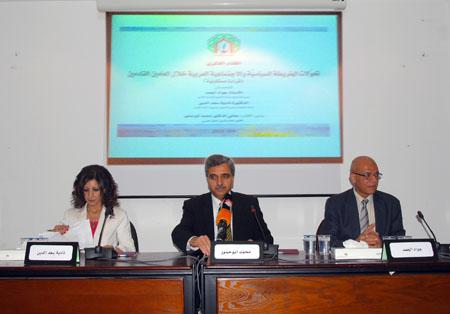You are here
‘Grassroots movements must take part in shaping region’s future’
By Dana Al Emam - Aug 10,2016 - Last updated at Aug 10,2016

Arab Thought Forum (ATF) Secretary General Mohammad Abu Hammour (centre), researcher Nadia Saad Eddine (left) and Director of the Middle East Studies Centre Jawad Hamad attend a meeting of ATF in Amman on Tuesday (Photo courtesy of ATF)
AMMAN — Despite regional uncertainty and political instability, grassroots political and social movements must participate in shaping the region’s future, experts agreed.
During a meeting late on Tuesday at the Arab Thought Forum (ATF), researchers and thinkers agreed that the so-called "Arab Spring" and the setbacks to the popular revolutions have substantially changed social and political dynamics in the region.
Meanwhile, they predicted that the current situation would continue for another decade, but highlighted the "inevitability" of change.
ATF Secretary General Mohammad Abu Hammour noted the political scene in the region was “unclear” in light of the divisions in some countries, and the intervention of many regional and international players.
Scholars and researchers must address “difficult and necessary” questions about the region’s future, he stressed, adding that otherwise, the interests and plans of other nations would come into play.
Meanwhile, Jawad Hamad, director of the Middle East Studies Centre, said "information chaos" had caused "unprecedented" difficulties for researchers, adding that most media content on regional developments was unsourced or inaccurate.
Established social and political movements, as well as new movements representing the youth and “marginalised groups”, have risen in the revolutions and the ensuing “setbacks” since 2011, he said.
But the new dynamics created space for the interference of external forces, a matter that increased societal and political "fragility" and further complicated the political outlook, he added.
The “Arab spring” gave moderate political Islamists an opportunity to re-organise and form coalitions, he said, adding that they would not be “eradicated completely” despite government constraints.
Hamad said that Arab social forces had responded to external anti-terrorism interventions in the region in two ways; with sectarianism, or by questioning if reform efforts would be more effective than fighting terrorism.
For researcher Nadia Saad Eddine, the deep divisions breaking up intra-Arab relations and the decreased attention to the Palestinian cause will allow US-led anti-terrorism efforts to draw new geopolitical boundaries in the region.
She expected a decline in US involvement in the region after the presidential election, adding that the EU’s internal concerns would leave room for Moscow to become an important regional player.
Political reforms and the return of stability will take time, she said, noting that studies suggested the current instability would continue for the next five to fifteen years.
Related Articles
TUNIS — The leader of Tunisia’s Islamist-inspired opposition party Ennahdha was questioned and then allowed to go free by an anti-terror uni
AMMAN — Deputy overall leader of the Muslim Brotherhood Zaki Bani Rsheid is expected to be released from jail within the next two weeks, a t
AMMAN — Closing the gap between the stipulation and enforcement of legislation protecting individual’s rights and freedoms require collabora

















